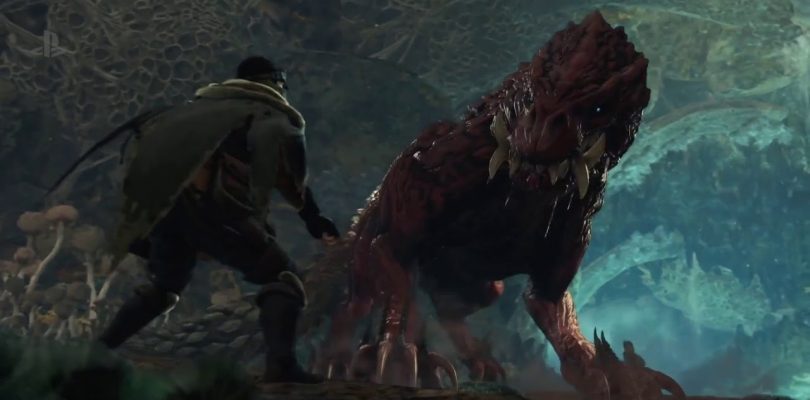Capcom has had some rough patches over the years, especially when it comes to cancelling Mega Man games, making weird mobile ports, and still saying nothing about Monster Hunter XX on Switch. However, Capcom is also on a bit of a golden streak with games like Resident Evil 7, which became an instant classic and reviving a troubled series. With Monster Hunter World, there is hope that one of my favorite series gets enhanced in ways I’ve wished for since finding the original game in a K-Mart bargain bin all those years ago. Luckily, the cancer that is loot boxes will be nowhere to be found in Monster Hunter World.
Gamespot recently interviewed series producer Ryozo Tsujimoto, where he said some things that shows there is still hope for the AAA gaming world. On the topic of having loot boxes in Monster Hunter World, Tsujimoto said, “I think that Monster Hunter has already built that kind of randomized, item reward into the gameplay. Whenever you carve a monster after a hunt, you don’t know what you’re gonna get within a certain range. You’ve got certain rare parts that you almost never get. You’ve got some of the ones you don’t need that you get a lot of. And then there are the rewards for the quest as well. There are some [rewards] that are standard, there are some that are randomized, and a bit bigger or smaller chance of getting them”
When asked about using micro-transactions to save time, an argument many a publisher will tout to convince players that they’re keeping player convenience in mind, Tsujimoto said, “Our focus is on wanting to get people to play our action game and feel the kind of satisfaction that comes with the achievement you get with completing a hunt and getting rewards. We want people to have the experience that we’ve made for them rather than the option to skip the experience.”
To summarize, Tsujimoto wants his players to play the game as its own reward. Overcoming challenges, hunting with friends, getting new armor through the game’s progression system, these are all rewarding parts of the game. As brought up by Jim Sterling in his video on the matter, Monster Hunter World could be ravaged by a greedy publisher seeking to exploit players. The game’s design could easily be modified with micro-transactions of all flavors.
To make things even more promising for Monster Hunter World, Capcom has said that they will bringing free DLC to the game, as they did with previous entries in the series. They already have Horzion Zero Dawn items planned and while these items are usually pretty hard to get, finally getting them is the coolest feeling.
Personally, I’ve never liked loot boxes in any capacity. Almost every argument for them has been discussed to the grave and at this point having loot boxes may end up hurting sales than being the financial stimulant that publishers are looking for. It has certainly become a negative buzz word among other games media outlets. I have seen one or two monetization systems that I can applaud, but most of them come off as greed fueled attempts to drain wallets of those with addictive tendencies.
“We want people to have the experience that we’ve made for them rather than the option to skip the experience.” – Ryozo Tsujimoto, Series Producer
Even though it’s another system of cosmetics and a few exclusives hidden in chests, Smite actually does one thing that I wish more games would mimic. In Smite, players cannot get the same item twice. This means that for long time players, the chances of getting a chest exclusive skin is fairly high. It’s not perfect and getting things like the Odyssey Skins can eat up a ton of cash, but that little detail makes it easier to stomach as someone who genuinely enjoys the game.
I’d like to include a full-price retail game with a good micro-transaction system, but to be honest I have never ran across one. A lot of this actually evolved from paid DLC, which at its core is an amazing idea that I wholeheartedly support. Playing games that have the ability to be expanded upon with extra levels, characters, and the like is the type of thing that really increase a game’s value over time. Sure the more elaborate DLCs take resources to make, but with a smart budget its certainly doable.
I think the game industry may be shifting away from bloated marketing budgets. Remember Dante’s Inferno? That game had an exceptional marketing campaign, but the game was a pretty average clone of God of War. If that bloated budget would have put into the game’s actual development, I think it would have sold more copies on its merits alone. These days its entirely plausible to sell millions of copies of a game from a basement, just from the ease of distribution and game design. Games like Undertale, Shovel Knight, and even Hellblade: Senua’s Sacrifice all saw success with modest budgets.
I really hope to see an end to the loot box trend, if not altogether than at least in games that cost $60 or more up front. I wish there was more transparency as well with things like sales data; that’s knowledge that really could benefit insight, as well as solidify speculation. With companies like Capcom sticking to their guns and not accepting loot boxes in their biggest games, maybe things will shift a bit, but it will take continued commitment to valuing players over payers.
If anything, I know that upon Monster Hunter World‘s release, Capcom will have earned my money.





